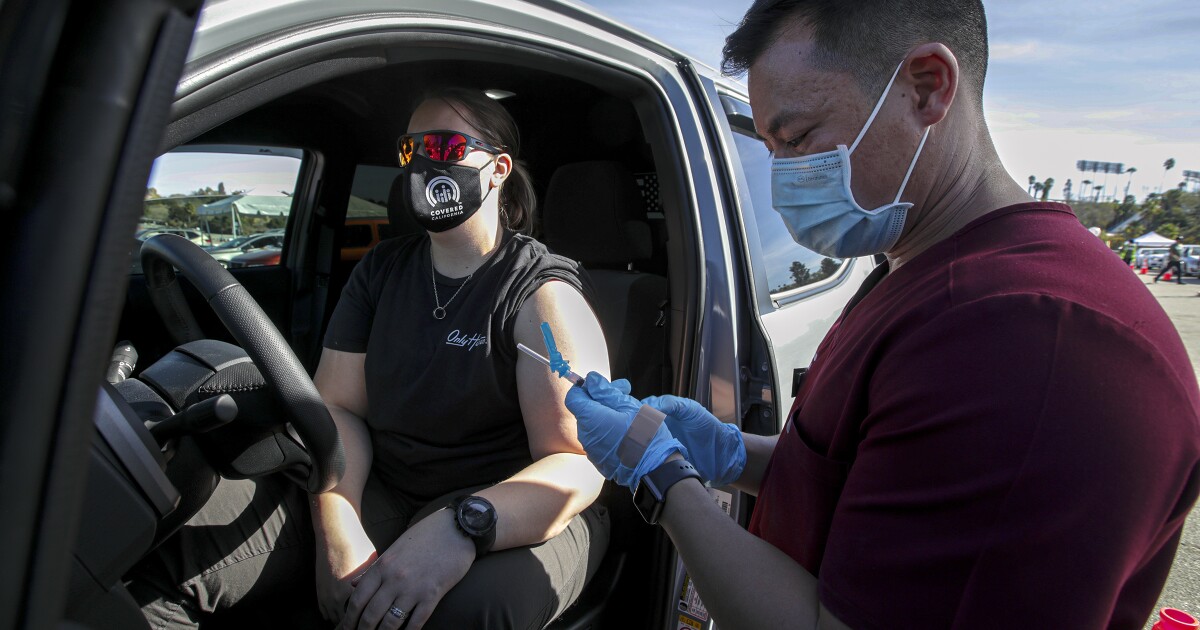Four days before some 4.4 million Californians with underlying disabilities or health conditions became eligible for the vaccine, the California Department of Public Health released guidance on the verification process.
Notably, the state does not require the physically disabled or sick to provide documentation of their condition. Instead, everyone will be asked to certify that they meet the criteria.
Advocates for the rights of the disabled have pushed for a process that would not create unnecessary barriers, especially for those with less mobility, motivated by problems with the leap in the vaccine line. The state also offered specific examples of people who would qualify for eligibility, but are not explicitly listed.
This includes people using regional centers, independent living centers, home support services, community-based adult services, Medi-Cal HIV / AIDS exemptions, exemptions from Medi-Cal community and home based alternatives, life exemptions assisted by Medi-Cal, an all-inclusive care program for the elderly, a California children’s services program if the client is between 16 and 21 years old and a program for people with genetic disabilities in California.
The new guidance came amid confusion over whether people in these categories could apply for vaccination. The state had previously defined Monday as the first day of eligibility, but many were hoping for a clearer direction.
The high-risk group includes 10 categories: People with cancer; chronic kidney disease, Stage 4 or higher; chronic lung disease; Down’s syndrome; compromised immune system due to solid organ transplantation; pregnancy; sickle cell anemia; heart diseases, such as heart failure, coronary artery disease and cardiomyopathies (excluding hypertension); severe obesity; and type 2 diabetes mellitus.
With population estimates for the group ranging from 4 to 6 million, and with other eligible groups totaling around 13 million, almost half of all Californians will now be eligible for the vaccine.
The authorities asked people to work with their health care providers to get vaccines as a first step.
“Check with your usual health care provider first to see if they have vaccines and consultations available. Healthcare providers who have vaccines can also start looking for you, as a patient with a significant high-risk medical condition or disability known to the provider, to schedule your vaccine appointment, ”said the state.
Other options include local pharmacies, the health department, community pop-up clinics or the My Turn website.
The state said people will not be required to prove that they have a disability or health problems when they are vaccinated.
“To protect confidentiality, documentation of verification of the diagnosis or type of disability is not required, but instead, anyone who meets the eligibility requirements will be asked to sign a self-attestation that it meets the criteria for illness or high-risk medical deficiencies, ”says the state said.
Authorities have warned that supplies will be limited and that people should expect delays.
California is reserving 40% of doses for people in underserved communities and 10% for teachers. There are still many people aged 65 and over who are also waiting for their vaccines. And with only a few days to go, confusion still reigns.
What’s more, Johnson & Johnson’s single-dose vaccine allocations will almost stop in the next two weeks as the company works to increase production, LA County Public Health Director Barbara Ferrer told a news conference on Wednesday.
“As we say, every time we are opening up to a new sector, we still have limited supplies,” said Ferrer, indicating that eligibility within a group does not guarantee an appointment. “It means that we are really very relieved to get started. “
Governor Gavin Newsom said on Wednesday that “in the immediate term” the state does not expect to receive additional doses of the Johnson & Johnson vaccine – which health officials hailed as a potential pandemic game changer, as it requires only one dose and do not need to be transported and stored in freezing temperatures.
In the bulletin sent on Thursday night, the state listed the following eligibility categories:
People aged 16 to 64 may be eligible if they are considered to be at a higher risk of becoming very ill due to COVID-19
OR because they have one or more of the following serious health conditions:
- Cancer, with weakened immune system
- Chronic kidney disease, stage 4 or higher
- Chronic, oxygen-dependent lung disease
- Down’s syndrome
- Solid organ transplantation, leading to a weakened immune system
- Pregnancy
- Sickle cell anemia
- Heart problems, such as heart failure, coronary artery disease or cardiomyopathies (but not hypertension)
- Severe obesity (body mass index ≥ 40 kg / m2)
- Type 2 diabetes mellitus with hemoglobin A1c level greater than 7.5%
OR if, as a result of a developmental disability or other significant, high-risk disability, one or more of the following criteria apply:
- A COVID-19 infection can result in serious life-threatening illness or death; OR
- The acquisition of COVID-19 will limit an individual’s ability to receive ongoing care or services vital to their well-being and survival; OR
- Providing adequate and timely COVID care will be particularly challenging as a result of the individual’s disability.
Source: California Department of Public Health
